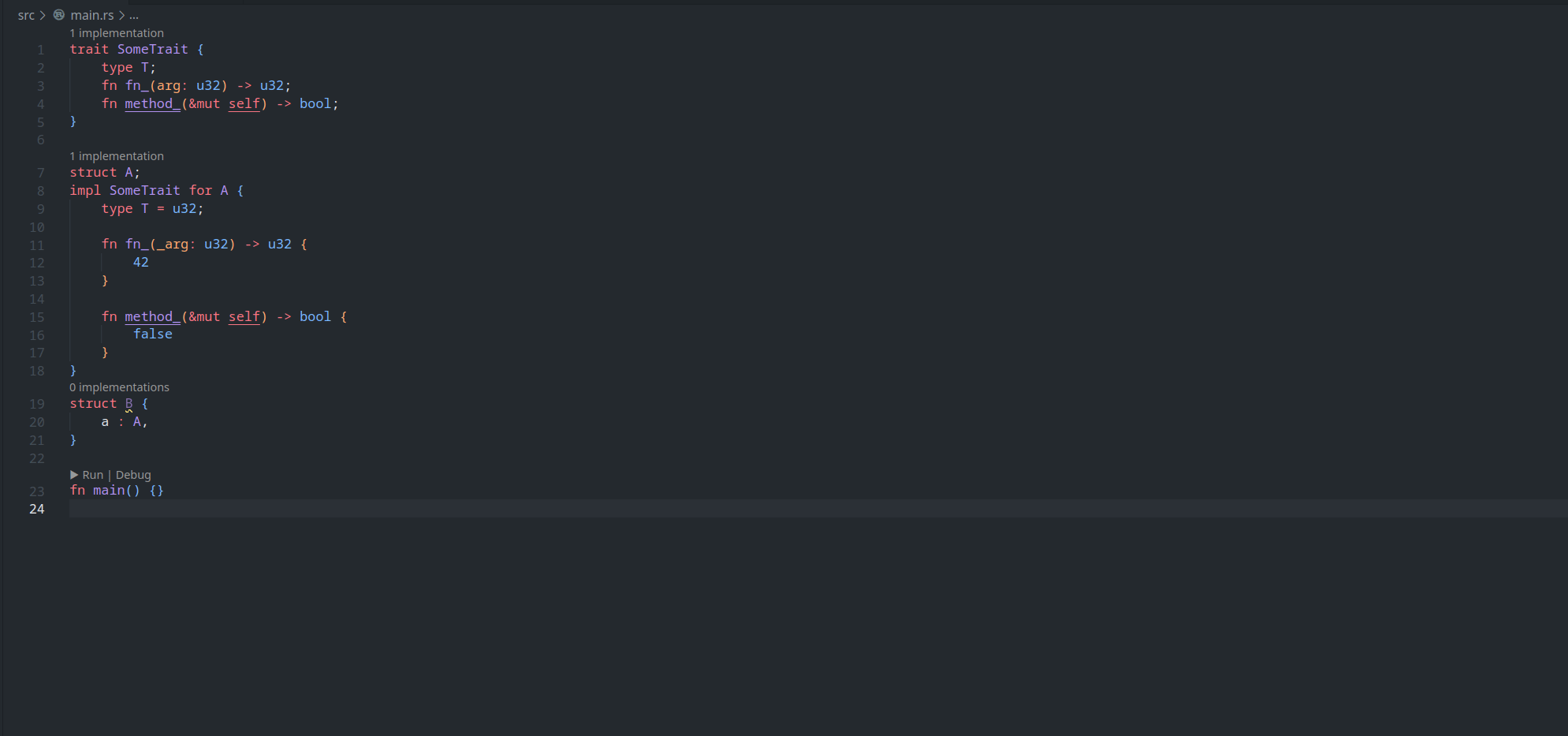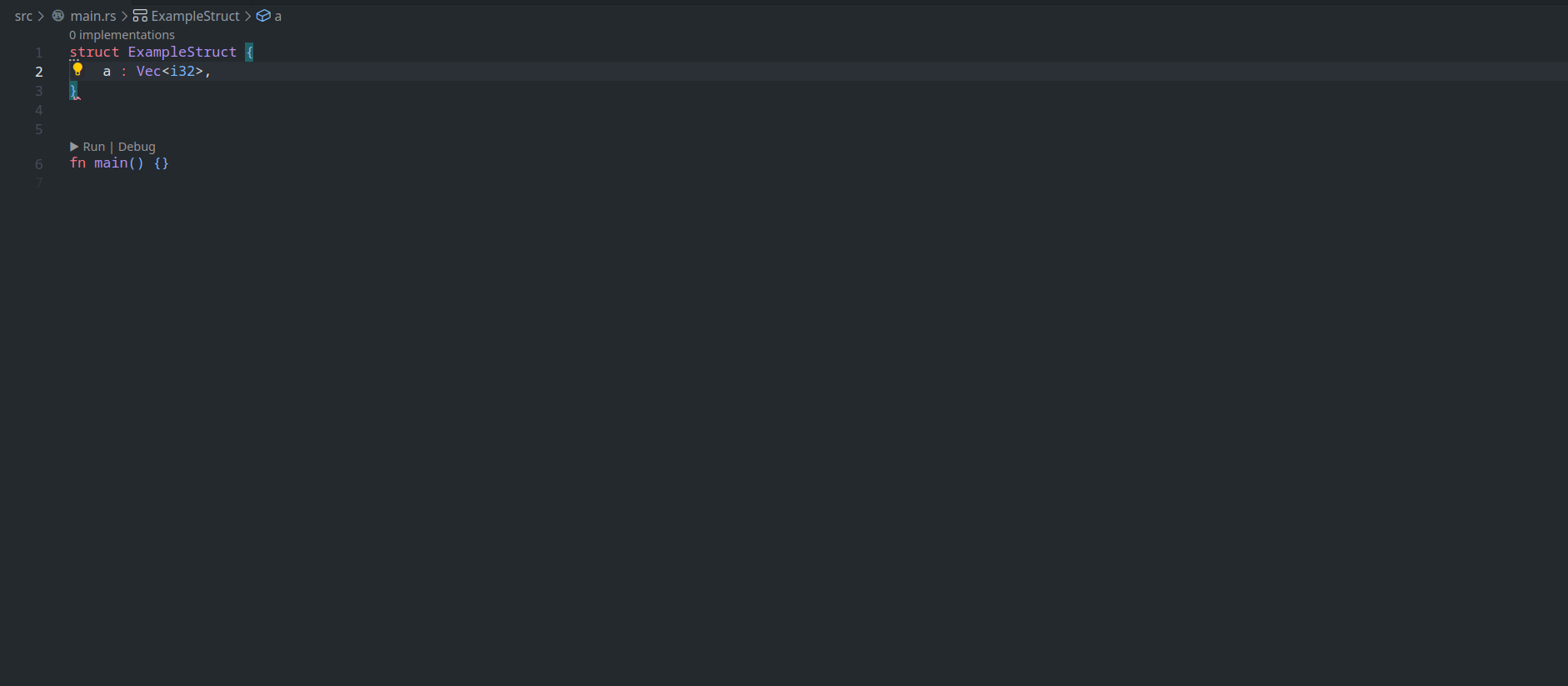Use anonymous lifetime where possible
Because anonymous lifetimes are *super* cool.
More seriously, I believe anonymous lifetimes, especially those in impl headers, reduce cognitive load to a certain extent because they usually signify that they are not relevant in the signature of the methods within (or that we can apply the usual lifetime elision rules even if they are relevant).
Fix runnable detection for `#[tokio::test]`
fix#15141
It is hacky, and it wouldn't work for e.g. this case:
```Rust
use ::core::prelude;
#[prelude::v1::test]
fn foo() {
}
```
But it works for the tokio case. We should use the name resolution here somehow, and after that we should probably also get rid of the ast based `test_related_attribute` function.
internal: add `library` fixture meta
Currently, there is no way to specify `CrateOrigin` of a file fixture ([this] might be a bug?). This PR adds `library` meta to explicitly specify the fixture to be `CrateOrigin::Library` and also makes sure crates that belong to a library source root are set `CrateOrigin::Library`.
(`library` isn't really the best name. It essentially means that the crate is outside workspace but `non_workspace_member` feels a bit too long. Suggestions for the better name would be appreciated)
Additionally:
- documents the fixture meta syntax as thoroughly as possible
- refactors relevant code
[this]: 4b06d3c595/crates/base-db/src/fixture.rs (L450)
Fix `self` and `super` path resolution in block modules
This PR fixes `self` and `super` path resolution with block modules involved.
Previously, we were just going up the module tree count-of-`super` times without considering block modules in the way, and then if we ended up in a block `DefMap`, we adjust "to the containing crate-rooted module". While this seems to work in most real-world cases, we failed to resolve them within peculiar module structures.
`self` and `super` should actually be resolved to the nearest non-block module, and the paths don't necessarily resolve to a crate-rooted module. This PR makes sure every `self` and `super` segment in paths are resolved to a non-block module.
internal: support `#[rustc_coinductive]`
rust-lang/rust#100386 changed the trait solver so that `Sized` is treated as coinductive trait, just like auto traits. This is now controlled by the perma-unstable `#[rustc_coinductive]` attribute (rust-lang/rust#108033), which this PR adds support for.
In practice, I don't think this matters much if at all. Currently we don't give chalk enough information so chalk cannot precisely (dis)prove `Sized` bounds.
internal: Add run-tests command
This command is similar to `cargo test` except that it uses r-a to run tests instead of compiling and running them with rustc. This is slower than `cargo test` and it is only useful for me to see a bird view of what needs to be fixed. The current output is:
```
48 passed, 5028 failed, 2 ignored
All tests 174.74s, 648ginstr
```
48 is very low, but higher than what I originally thought.
Now that there is some passing tests, I can show the plan:
https://github.com/rust-lang/rust-analyzer/assets/45197576/76d7d777-1843-4ca4-b7fe-e463bdade6cb
That is, at the end, I want to be able to immediately re run every test after every change. (0.5s is not really immediate, but it's not finished yet, and it is way better than 8s that running a typical test in r-a will take on my system)
Change comparsion for checking if number is negative to include 128
The last byte in Little-Endian representation of negative integers start at 128 (Ox80) till 255 (OxFF). The comparison before the fix didn't check for 128 which made is_negative variable as false.
Potentially fixes#15096
Added a test near positive extermes and two test near negative
extermes as well one for 0.
Added a test using the `as` cast and one with comparison with 0.
feature : assist delegate impl
This PR ( fixes#14386 ) introduces a new IDE assist that generates a trait impl for a struct that delegates a field. This is a draft because the current `ide_db::path_transform::PathTransform` produces some unwanted results when it deals with extern crates, an example of which I attach as a GIF.
GIFs :
1. A general case

2. A case where `ide_db::path_transform::PathTransform` fails to correctly resolve a property ( take `Allocator` as an example ) to its full path, thus causing an error to occur. ( Not to even mention that resolving this causes another error `use of unstable library feature 'allocator_api'` to occur

Reason: The last byte in Little Endian representation of negative
integers start at 128 (Ox80) till 255 (OxFF). The comparison before
the fix didn't check for 128 which made is_negative variable as false.
internal: remove spurious regex dependency
- replace tokio's env-filter with a smaller&simpler targets filter
- reshuffle logging infra a bit to make sure there's only a single place where we read environmental variables
- use anyhow::Result in rust-analyzer binary
- replace tokio's env-filter with a smaller&simpler targets filter
- reshuffle logging infra a bit to make sure there's only a single place
where we read environmental variables
- use anyhow::Result in rust-analyzer binary
Remove scope_for_def calls as the definition have been removed entirely.
As a result of this change the problem with false path resolutions has been solved.
internal: Record file dependencies in crate graph construction
Should fix the bug mentioned in https://github.com/rust-lang/rust-analyzer/issues/8623 where removing a crate root file will panic. I'm not too happy with the way this is done here but I can't think of a better way right now.